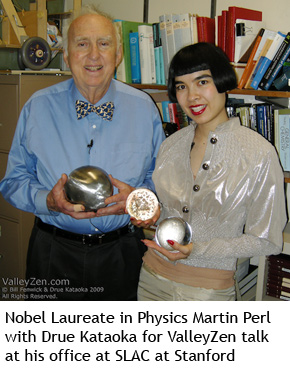Martin Perl, Nobel Laureate in Physics VIDEO EXCLUSIVE

Watch our exclusive interview with Prof. Perl who won the 1995 Nobel Prize in Physics for his discovery of the tau lepton, one of the elementary particles forming our world. In this lively video, experience his incredible energy, intellectual curiosity and excitement.
- How Prof. Perl missed “The Call” from the Nobel Committee
- How Nobel Laureates are treated in Sweden
- Dining with the King and Queen of Sweden (hint: can’t go to the bathroom, no matter what!)
- Why Physics is the simplest of the sciences
- Why complexity is easier than simplicity
- See the setup of Prof. Perl’s latest experiment
- Prof. Perl’s discussion of Negative Space and Dark Energy
- Why Emptiness is not empty in Modern Physics
- Prof. Perl’s advice:
Question all Laws!
“This question of how you can have confidence in what you are doing, but still question it is a paradox” says Perl.
In the next episode, Prof. Perl shares his memories of Prof. emeritus of Physics Max Dresden who was a friend of Albert Einstein. Drue also talks with Prof. Perl about how Prof. Dresden influenced her.



Martin Pearl emits so much intellectual energy– no wonder he has achieved so much in his career.
This interview is a gem– gives us amazing insights into the mind and thoughts of a genius.